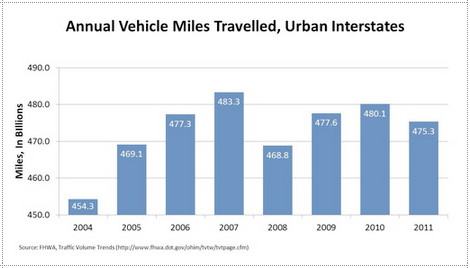More interesting and puzzling news about Americans' evolving driving habits: Research group INRIX recently announced that urban traffic congestion plummeted 30 percent in 2011 over the previous year.
INRIX's Traffic Scorecard Annual Report analyzed congestion on highways in America's 100 largest cities. Overall, the index for 2011 was 5.9, meaning commuters spent almost 6 percent more time on the roads due to congestion than if they were on traffic-free highways.
Traffic jams were down in 70 metros. INRIX attributed the decline to a "jobless recovery" from America's 2007-2008 economic meltdown -- the last time congestion declined so rapidly. Some metros with better employment figures and lower gas prices -- like Atlanta, Houston and Miami -- showed increased congestion, the organization noted.
In addition to high gas prices and poor economic performance, INRIX attributed vanishing congestion in part to a decline in road construction brought on by the completion of most stimulus projects, as well as uncertainty around federal infrastructure funding and anemic local and state budgets.
National declines in driving or increases in transit ridership were not mentioned as contributing factors.
Still, it's somewhat mysterious. Was the economy really so much worse in 2011 than 2010? Growth did slow down some in that time, but it was still positive.
Or is something else going on here -- like the "decoupling" of driving from economic fluctuations?
Unlike many reports on congestion, the INRIX analysis does not seize the opportunity to call for a massive campaign of road widening. The organization notes that only 1 percent of the nation's urban highways are sources of recurring congestion, something that was true even when congestion was at its highest in 2007. The vast majority of congestion problems are caused by incidental factors like collisions, weather conditions, construction projects and special events.
The report authors advocated action, but not large construction projects, in response to the lost productivity and waste caused by traffic snarls:
"Whatever the solutions may be – extra capacity, active traffic management, toll express lanes, transit alternatives, or creative ideas not yet thought of that shift just enough traffic from peak days/times/locations to break the gridlock – we will not unclog America’s key roads by adding line miles in the exurbs."







